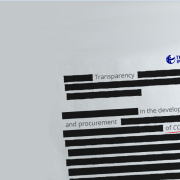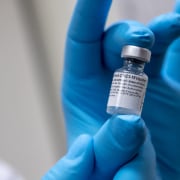|
Getting your Trinity Audio player ready...
|
By Karam Singh and Kirsten Pearson
First published on Business Live
Corruption Watch is trying to keep a close eye on Covid-19 vaccine procurement and rollout. Given the experiences with personal protective equipment (PPE) procurement and the impact the vaccine rollout has on each resident’s lives, we believe it is critical to monitor.
But our monitoring is not going as well as it could be. There are things we simply do not know, and while it appears that the risks of corruption in this phase of vaccine procurement are lower than with PPE procurement, we cannot say with full confidence that all is well.
In a recent radio interview one of the interviewers wanted us to be hard hitting, and less understanding that it’s a pandemic and officials are trying to navigate a sea of maladministration. It’s dangerous when watch-keepers accept a disaffected culture among officials and fail to convey the sense of urgency and disappointment that much of the public experiences.
On January 12 we wrote a letter to National Treasury. We published that letter and the response received on January 18. We were satisfied that the officials at the Treasury took the time to provide an extensive response, providing many — but not all — of the answers. For some of the big questions, for instance the extra oversight measures that will be put in place to clamp down on corruption, the Treasury referred us to the department of health.
We wrote to the department of health on January 27. To date, not one official has bothered to even acknowledge receipt of our letter, never mind address our questions. If the health department were keeping up with other countries in terms of vaccine rollout, and making the information sufficiently transparent, we would have less reason for concern. However, with information released in dribs and drabs, we are writing to busy senior officials about their plans for special oversight and transparency measures due to our troubled recent history of procurement debacles.
On a first reading of the Treasury responses it all sounds quite reassuring, but on deeper examination what the Treasury is essentially saying is: “We are following the Public Finance Management Act (PFMA). We always follow the PFMA.” There is a business-as-usual approach that raises concerns.
While it is important that the government assures the public by saying it will follow the law and rules, this is a bare minimum. The truth is that merely following the letter of existing procurement legislation has been insufficient to prevent corruption. In the current legislative environment and culture within the government, preventing corruption seems to be no-one’s job and everyone’s job, so little of that happens. We are concerned about the questions that remain unanswered by the department.
On February 2 a screengrab about a newly registered company called Jova Vaccines Supply was doing the rounds. Beneath the screengrab it was alleged that the company, which was registered on January 29, is owned by the daughter of the Mpumalanga premier.
Activists who are aware that Corruption Watch is monitoring vaccine procurement requested that we investigate and verify the claim. Because every place we should have been able to find information about vaccine procurement has none, it took us most of a morning to determine that this is disinformation.
An environment in which the levels of trust have broken down so deeply between the people and the government has become fertile ground for disinformation and conspiracy. When the government fails to provide proper information, others will seek to fill the void for their own motives.
The only director of Jova Vaccines Supply is a 54-year-old male who does not have the same surname as the premier — so certainly not her daughter. By the afternoon a media release was circulating on social media reading that the Mpumalanga premier condemns false reports alleging the involvement of a family member in a company called Jova Vaccines Supply.
We could not easily confirm the veracity of this media release either, since it is not published on the official website, where the last media statement from the premier’s office is from July 2019. While we were able to sift out the facts from what is incorrect, we still have some concerns about Jova Vaccine Supply specifically.
Monitoring vaccine procurement is challenging because we’re working in an information vacuum. A closed tender on the basis of urgency is being conducted for Covid-19 vaccine and the distribution thereof. As far as we can tell, the department of health has published no procurement information on its website about the vaccine and logistics procurements that have been done through a deviation from standard procurement practices.
Other risks
At this stage the Treasury also has not put this information on the eTender portal. The kind of information that is published throughout an open tender process simply is inaccessible to the public when a deviation is occurring. In this case, no tender documents or contracts are available to verify what has been agreed and what the scope of work is.
While the department of health and the Treasury have held media briefings, and it appears that at least some of the vaccine procurement risks are being managed, there are other risks and the department of health has yet to enlighten us about how it plans to manage them. These risks include the safety and security of the vaccine supply chain and rollout.
If the procurement information vacuum persists we can expect more corruption and more anger and outrage, followed by investigations that take months if not years, and nothing much in the way of accountability.
The lack of accountability in turn leads to a general public despair and, worse, acceptance that nothing can be done about the widespread theft of public money. Meanwhile, people’s rights are unrealised and in the worst cases, corruption and poor implementation results in deaths. When nurses and doctors continue to struggle with inadequate PPE, it’s the patients in public hospitals who suffer.
Big concern
In the case of Jova Vaccine Supply, it was somewhat challenging to debunk the disinformation about the company. This is just one of many instances in which limited information is available in the public domain.
Our big concern with Jova is that its director has many directorships — a red flag in the sense that no one person can feasibly stretch their time to such an extent and offer a meaningful value-adding service. We do not see evidence of sufficient due diligence being done prior to granting the registration of companies or sufficient oversight of shelf companies.
There is an urgent need for much improved preventative controls, real-time monitoring and procurement information to be published in line with open data standards, not only for Covid-19 procurement but for all procurement across all spheres of government.
Shoulder-shrugging coupled with poor planning and oversight across departments has gone on for too long, and corruption is going unchecked. If some of this is taking place because ethical public servants fear dismissal, we need to speak frankly about that. Otherwise too many politicians and public servants are failing to be accountable in the exercise of administrative justice and the public’s despair about corruption and distrust of government regarding these matters goes unaddressed.







